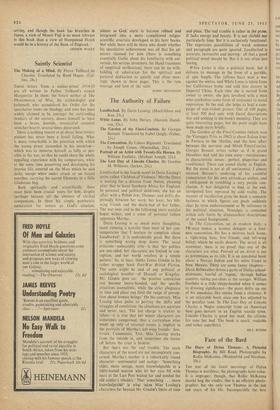The Authority of Failure
The Convention. By Libero Bigiaretti. Translated by Joseph Green. (Macmillan, 21s.) Portrait of an Artist with Twenty-Six Horses. By William Eastlake. (Michael Joseph, 21s.) The Last Day of Lincoln Charles. By Gordon
Landlocked is the fourth novel in Doris Lessing's series called 'Children of Violence.' Martha Quest is waiting for a divorce from Anton, planning after that to leave Southern Africa for England. In personal and political doldrums, she has an affair with a Polish Jew, Thomas; and drifts dis- piritedly between her work, her lover, her left- wing friends and the death-bed of her father. The war ends and in the following years socialist hopes wither, and a sense of personal failure oppresses Martha..
Doris Lessing is so much more thoughtful, more cunning a novelist than most of her con- temporaries that I hesitate to complain about Landlocked: it is undoubtedly good. But there is something wrong deep down. The usual criticism—unbearably trite--is that 'her politics are one-sided, her characters are limited in con- ception, and her world revolves in a simple pattern.' So, at least, thinks James Gindin in his rather scrappy book Post-War British Fiction. The same might be said of any political or sociological novelist—of Disraeli or Kingsley. Mr. Gindin goes on : 'the positive conviction can become heavy-handed, and the specific situations Journalistic, while the strict allegiance to time and place can limit the range of percep- tion about human beings.' On the contrary, Miss Lessing takes pains to portray the shifts and struggles of conviction; the situations are accurate and never racy. The last charge is trickier to refute—it is true that her minor characters are sometimes categorised, that a curriculum vitae made up only of external events is implicit in the portraits of Martha's left-wing friends: Jew, Greek, Communist, Trot., Miss Lessing works from the outside in, and sometimes she leaves' ofl before the crust is broken.
But that's not the real trouble. The main characters of the novel are not incompletely con- ceived. Martha's mother is a remarkably round character--sentimental and savage: 'Something older, more savage, more knowledgeable in a tidily-hatted matron who let her eyes fill with tears at the Last Post waited for and needed the old soldier's ribaldry.' That 'something . . . more knowledgeable' is what takes Miss Lessing's characters far beyond Mr. Gindin's limits of time
and place. The real trouble is rather in the prose. It lacks energy and beauty. It is not cliched nor particularly limp. But it is exclusively functional. The expressive possibilities of word, sentence and paragraph are quite ignored. Landlocked is accurate, instructive and moving : all that a good political novel should be. But it is too often just boring.
White Lotus is also a political book, but it delivers its message in the form of a parable, of epic length. The yellows have won a war against the whites, and White Lotus is taken from her Californian home and sold into slavery in Imperial China. Each time she is moved from owner to owner, she gets involved with a man who symbolises some form of resistance to racial oppression. In the end, she helps to lead a cam- paign of non-violent protest. Out of 600 pages, at least 500 deal only with literal descriptions that add nothing to the book's meaning. They are quite interesting pages, but the point might have been made more briefly.
The Garden of the Finzi-Continis (which won the Viareggio Prize in 1962) is about Italian Jews in Ferrara in the 'thirties, and the love affair between the narrator and Miceli Finzi-Contini. Giorgio Bassani writes rather as if le grand Meaulnes had told his own story—reminiscence in characteristic tenses: perfect, pluperfect and conditional. These can sound slushy in English. But the novel is not at all sentimental. I almost mistook Bassani's rendering of his youthful romanticism for his own attitude,as author, and I anticipated in trembling a very purple con- clusion. It was delightful to find, at the end, unrequited love reproved by cold reality. The manner of recollection gives the book a romantic haziness in which figures are made suddenly clear by terse understatement or"by reference to the political situation. Nostalgia is contained within safe limits by dispassionate descriptions of the social background.
In The Convention, set in modern Italy, a PR-man makes a woman delegate at a busi- ness convention. He has a mistress back home, a right-wing boss, few friends, and left-wing beliefs which he easily deserts. The novel is all statement; there is no proof that any of the characters are alive. Portrait of an Artist is not as pretentious as its title. It is an anecdotal book about a Navajo Indian and his white friend in New Mexico. There are some funny chapters— Doris Bellweather drives a party of Dallas school- mistresses, fearful of 'rapine,' through Indian country, taking pot-shots at the savages. William Eastlake is a little sleepy-headed when it comes to drawing significance—the point drifts up out of his anecdotes like smoke from a chimney. It is an enjoyable book once one has adjusted' to the peculiar tone. In The Last Day of Lincoln Charles a Negro conscript from an American base goes berserk in an English seaside town. Lincoln Charles is good but mad, the citizens are sane but bad. The book is quick, readable and rather superficial.
BILL BYROM






































 Previous page
Previous page